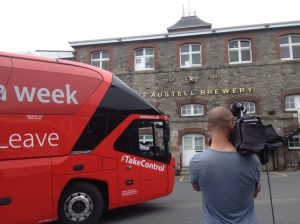
Canvassing recently my ear was firmly bent by someone who voted Leave and is worried about the NHS. The promise of £350 million per week might have evaporated on the morning after the referendum, but her concerns have not. She’s not angry at the lie: for her this is just one more in the chain of politicians’ lies. The worry is real.
One of the memorable moments in Laura Kuenssberg’s documentary on the referendum had Leave voters in Sunderland saying “now people in London have got to listen to us”.
Instead we have a prime minister saying “Brexit means Brexit” and talking of the “will of the people”, but who reacted to being reigned in by the courts by bring a bill before parliament to give her huge powers in the Brexit process. This sounds like a land grab from No.10 rather than an attempt at listening.
What happens now to the people who felt left behind?
People who voted Leave because life is hard were not voting for it to become harder. Cornwall voted for Brexit, and now finds the London will not provide the money they have been receiving from Brussels. People were persuaded that immigrants are to blame for many of life’s woes: that doesn’t mean they voted to find out the hard way that that is not true.
Some have suggested that the Brexit vote was a form of self-harm. That’s not an irrational act: it’s what people do when the pain from things they can’t control is too great, and alleviated by a pain they can. When people are in that place, the first thing to do is to listen to them.
Many of these people are traditional Labour voters, who they now seem to be ignoring. With honourable exceptions, it feels instead as if Labour and Conservatives are competing to out-UKIP UKIP. Our system expects the opposition to be a “government in waiting”: right now it is missing in action, failing to hold the government to account over Brexit, and failing to engage with those who would lose most from a hard Brexit.
The brutal criticism of traditional socialism is that it has to keep people poor so they go on voting socialist. New Labour was a valiant attempt to get out of that space that Corbyn’s Labour rejects.
The Liberal Democrat perspective on this is a game-changer. Our emphasis on community-based politics means we start in a different place. A world where no-one is “enslaved by poverty” has a different feel from the toxic language of envying the wealthy: it’s an invitation instead to create opportunity and possibility. It’s a hope-filled message when hope (rather than fantasy) is missing.
That is a more subtle message than can be conveyed in the heat of parliamentary by-elections, but it sits naturally with the community dimension of local election campaigns.
Personally, I think the Liberal Democrat messaging on diversity is about trying to change the whole of society for the better. Freedom from “enslavement by poverty” is one important aspect of this.
The deafness and ineptness of the two big parties are creating a need for the Liberal Democrats: can we step up to it? Can we show that listening was not confined to one badly-worded question on 23 June 2016?
Originally published on Liberal Democrat Voice